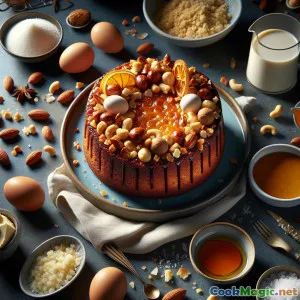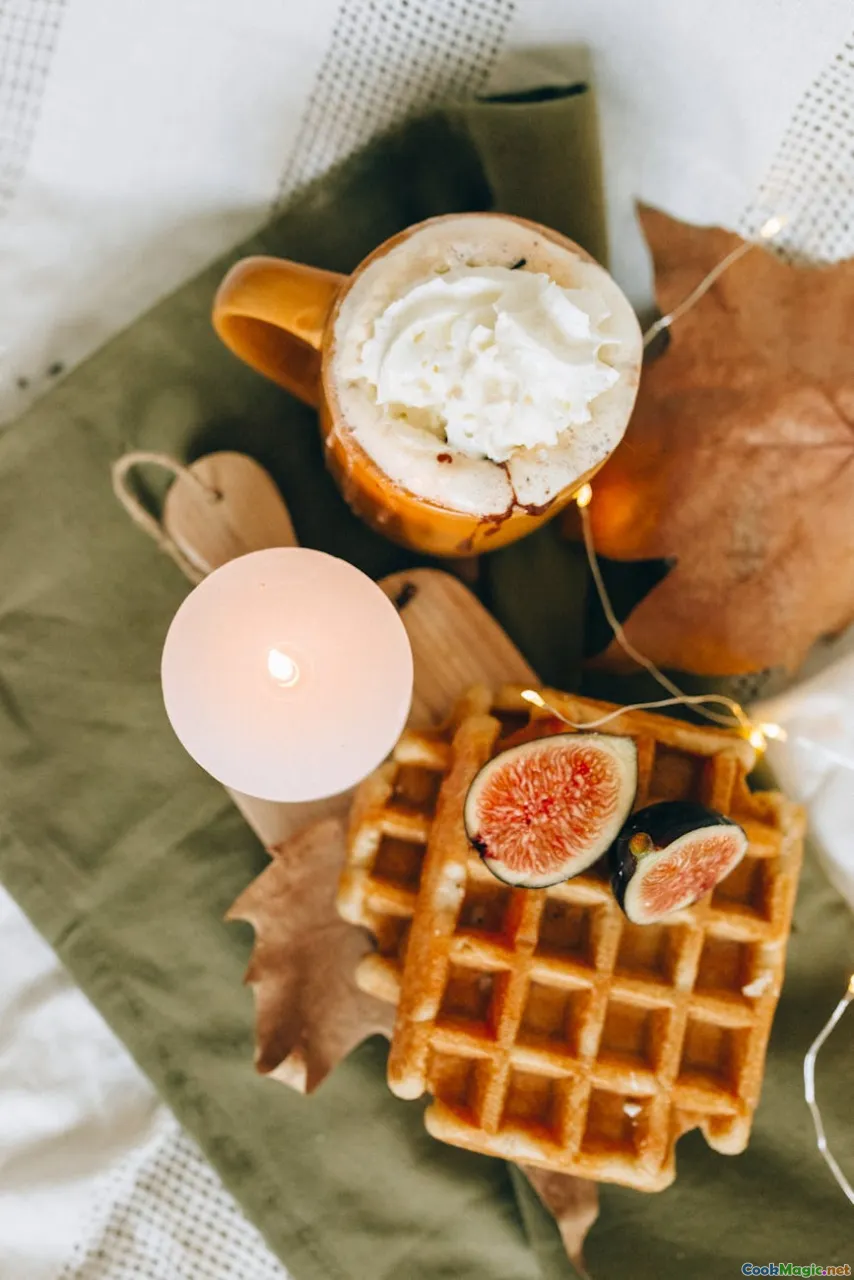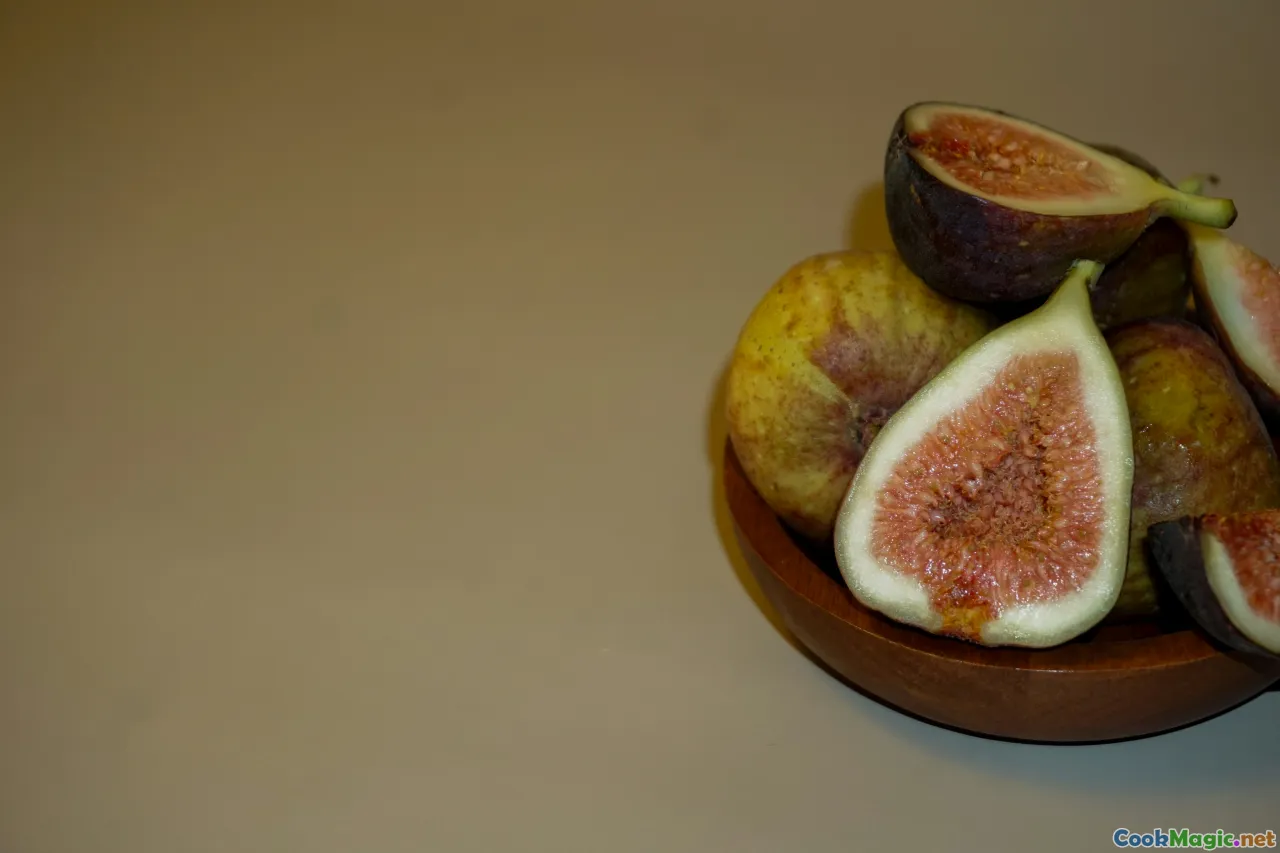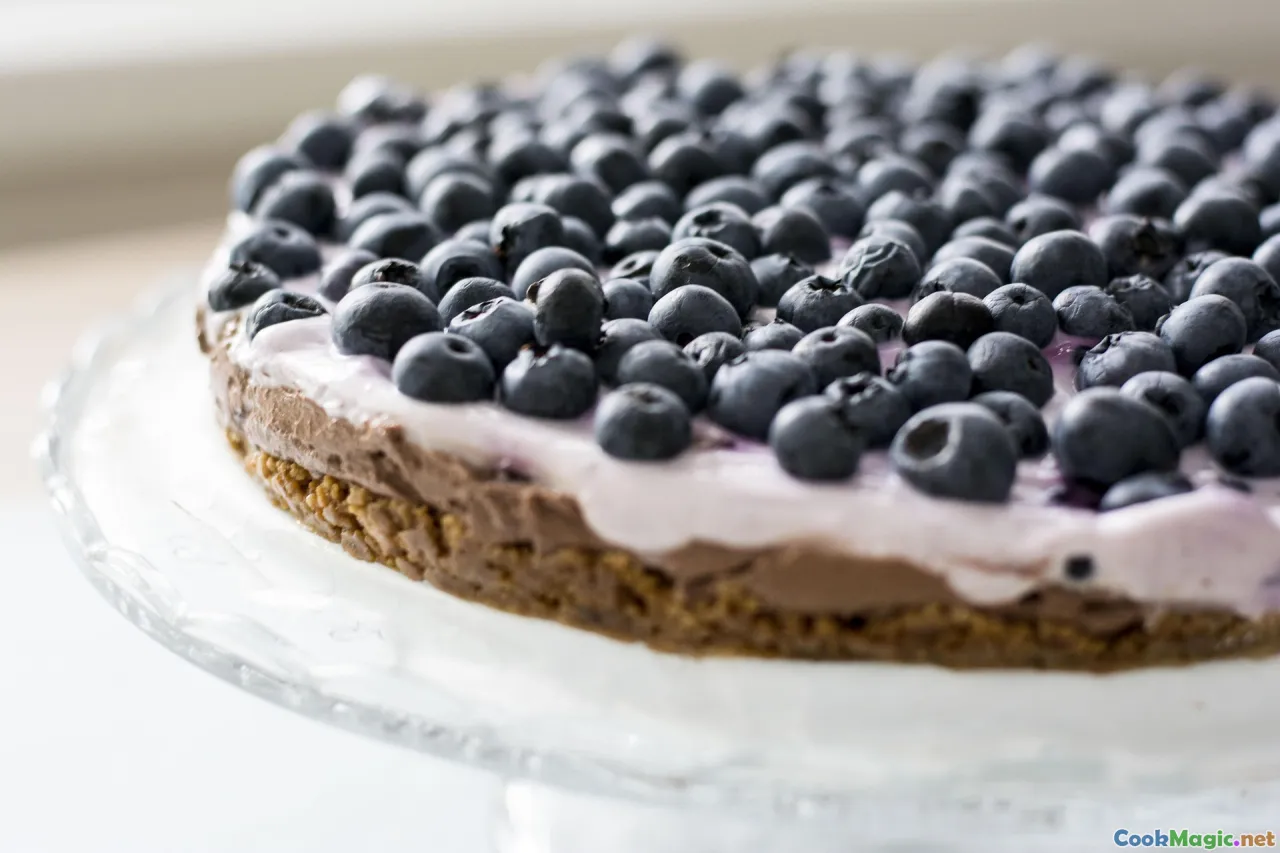
Bánh hạt Karaka với lớp phủ mật ong
(Karaka Nut Cake with Honeyed Glaze)
(0 Đánh giá)0
372
tháng 10 31, 2025
Báo cáo sự cố
Nguyên liệu
-
150 grams Bơ nhạt, đã tan chảy và để nguội
(Adds richness; cool to lukewarm to avoid scrambling eggs)
-
150 grams Đường nâu nhạt
(Lightly packed for gentle caramel notes)
-
50 grams Đường cát
(Balances sweetness and structure)
-
3 large trứng lớn
(Room temperature for better emulsion)
-
2 tsp Chiết xuất vanilla nguyên chất
(Enhances nutty aroma)
-
1 tbsp Vỏ cam bào nhuyễn
(Bright citrus lift; lemon zest also works)
-
180 grams Sữa chua tự nhiên hoặc kem chua
(Keeps cake tender and moist)
-
220 grams Bột mì đa dụng
(Spoon and level for accuracy)
-
60 grams Bột hạnh nhân xay mịn
(Adds moisture and delicate crumb)
-
2 tsp Bột nở
(Primary leavener)
-
0.25 tsp Bột nở
(Aids browning with yogurt acidity)
-
0.5 tsp muối biển mịn
(Cân bằng độ ngọt)
-
150 grams Hạt macadamia rang thơm, băm thô
(Primary nut for buttery crunch; cool before folding in)
-
40 grams Hạt karaka được chế biến công nghiệp, băm nhuyễn
(Use only food-safe, commercially processed kernels; never raw or foraged)
-
60 ml Mānuka hoặc mật ong chất lượng tốt
(For the glaze; maple syrup is an alternative)
-
1 tbsp Nước
(Thins glaze to brushing consistency)
-
1 tsp Nước cốt chanh tươi
(Balances sweetness in glaze)
-
20 grams Coconut nạo khô
(Optional garnish for texture)
-
1 pinch Muối biển mỏng tanh
(Optional finishing touch to enhance sweetness)
(Adds richness; cool to lukewarm to avoid scrambling eggs)
(Lightly packed for gentle caramel notes)
(Balances sweetness and structure)
(Room temperature for better emulsion)
(Enhances nutty aroma)
(Bright citrus lift; lemon zest also works)
(Keeps cake tender and moist)
(Spoon and level for accuracy)
(Adds moisture and delicate crumb)
(Primary leavener)
(Aids browning with yogurt acidity)
(Cân bằng độ ngọt)
(Primary nut for buttery crunch; cool before folding in)
(Use only food-safe, commercially processed kernels; never raw or foraged)
(For the glaze; maple syrup is an alternative)
(Thins glaze to brushing consistency)
(Balances sweetness in glaze)
(Optional garnish for texture)
(Optional finishing touch to enhance sweetness)
Dinh dưỡng
- Khẩu phần: 10
- Kích thước khẩu phần: 1 slice (90g)
- Calories: 420 kcal
- Carbohydrates: 0 g
- Protein: 7 g
- Fat: 24 g
- Fiber: 3 g
- Sugar: 22 g
- Sodium: 200 mg
- Cholesterol: 65 mg
- Calcium: 90 mg
- Iron: 1.8 mg
Hướng dẫn
-
1 - Prep and preheat:
Preheat oven to 170°C (340°F). Grease and line a 23×13 cm (9×5 in) loaf tin with parchment, leaving a sling for easy removal.
-
2 - Toast the macadamias:
Spread macadamias on a tray and toast for 6–8 minutes until lightly golden and aromatic. Cool completely, then roughly chop.
-
3 - Combine Wet Ingredients:
In a large bowl, whisk eggs, brown sugar, granulated sugar, vanilla, and orange zest until thick and slightly pale. Whisk in melted, cooled butter, then yogurt.
-
4 - Mix the Dry Ingredients:
In another bowl, whisk flour, ground almonds, baking powder, baking soda, and salt until evenly combined.
-
5 - Create the batter:
Add dry ingredients to the wet mixture. Fold gently with a spatula just until no dry streaks remain; do not overmix.
-
6 - Fold in nuts:
Fold in chopped macadamias. If using commercially processed karaka kernels, fold them in now. Avoid using raw or foraged karaka kernels.
-
7 - Pan and bake:
Scrape batter into the tin, smooth the top, and bake 45–50 minutes until a skewer comes out with a few moist crumbs and the top springs back.
-
8 - Prepare the honey glaze:
In a small pan, gently warm honey with water and lemon juice until fluid. Do not boil. Keep warm.
-
9 - Glaze and cool:
Brush half the warm glaze over the hot cake. Cool 15 minutes in the tin, lift out, transfer to a rack, and brush with remaining glaze. Sprinkle coconut or flaky salt if desired.
-
10 - Slice and Serve:
Cool to just warm or room temperature before slicing. Serve as is or with lightly sweetened yogurt or crème fraîche.
Preheat oven to 170°C (340°F). Grease and line a 23×13 cm (9×5 in) loaf tin with parchment, leaving a sling for easy removal.
Spread macadamias on a tray and toast for 6–8 minutes until lightly golden and aromatic. Cool completely, then roughly chop.
In a large bowl, whisk eggs, brown sugar, granulated sugar, vanilla, and orange zest until thick and slightly pale. Whisk in melted, cooled butter, then yogurt.
In another bowl, whisk flour, ground almonds, baking powder, baking soda, and salt until evenly combined.
Add dry ingredients to the wet mixture. Fold gently with a spatula just until no dry streaks remain; do not overmix.
Fold in chopped macadamias. If using commercially processed karaka kernels, fold them in now. Avoid using raw or foraged karaka kernels.
Scrape batter into the tin, smooth the top, and bake 45–50 minutes until a skewer comes out with a few moist crumbs and the top springs back.
In a small pan, gently warm honey with water and lemon juice until fluid. Do not boil. Keep warm.
Brush half the warm glaze over the hot cake. Cool 15 minutes in the tin, lift out, transfer to a rack, and brush with remaining glaze. Sprinkle coconut or flaky salt if desired.
Cool to just warm or room temperature before slicing. Serve as is or with lightly sweetened yogurt or crème fraîche.
Thông tin thêm về: Bánh hạt Karaka với lớp phủ mật ong
About this recipe
Karaka Nut Cake is a tender, aromatic loaf that nods to Aotearoa New Zealand’s native karaka tree while keeping modern kitchens safe and approachable. The karaka tree (Corynocarpus laevigatus) bears glossy orange drupes with kernels that, in their raw state, contain toxins. For generations, Māori communities developed sophisticated, time-intensive methods to render the kernels edible through careful processing and leaching—a culinary technology that speaks to deep ecological knowledge and respect for the land. This recipe honors that heritage with flavor inspirations and story, yet relies on widely available, safe-to-use macadamias for the cake’s buttery crunch. If you have access to verified, commercially processed karaka kernels, you can fold in a small amount for aroma and authenticity—but never use raw or foraged kernels.
Flavor profile and texture
This loaf balances caramel notes from brown sugar, citrus brightness from orange zest, and the lush, almost buttery character of macadamias. Almond meal contributes a delicate, fine crumb that stays moist for days, while a warm honey glaze—mānuka if you can find it—adds a fragrant sheen and a whisper of herbal complexity. The result is a slice that’s not overly sweet, with enough richness to satisfy as an afternoon tea cake or a dinner-party dessert with a dollop of yogurt.
Practical tips
- Nut prep: A short toast deepens nut flavor and helps maintain crunch after baking. Let nuts cool before folding in so the batter doesn’t thicken prematurely.
- Mixing: Fold the dry ingredients gently. Overmixing develops gluten and toughens the crumb. Stop as soon as the flour streaks disappear.
- Pan choice: A light-colored loaf tin promotes even baking and minimizes over-browning on the edges.
- Doneness: Aim for a skewer with a few moist crumbs, not wet batter. The carryover heat will finish the bake as it cools.
- Glaze: Brush half the glaze on while hot to lock in moisture, then the remainder after demolding for a glossy finish.
Safety note on karaka
Karaka kernels are not like ordinary nuts. In their raw or improperly processed state, they can be dangerous to consume. This recipe is designed to be excellent with macadamias alone. Only use karaka kernels if they are from a reputable, food-safe commercial source. Do not attempt foraging or home processing of karaka; traditional preparation requires specialized knowledge and should not be improvised. When in doubt, omit them—the cake remains delicious and true to the spirit of New Zealand flavors.
Substitutions and variations
- Nuts: Macadamias pair beautifully, but toasted hazelnuts or blanched almonds produce a lighter crunch. Chestnuts give a soft, sweet, earthy nuance.
- Citrus: Swap orange zest for lemon or grapefruit; adding a tablespoon of finely chopped crystallized ginger brings bite and warmth.
- Dairy-free: Use neutral oil (such as light olive or sunflower) instead of butter and a thick coconut yogurt in place of dairy yogurt. Expect a slightly denser crumb with lush moisture.
- Gluten-free: A 1:1 gluten-free baking blend with xanthan gum works well; add an extra tablespoon of yogurt to keep the crumb supple.
- Toppings: Toasted coconut adds texture, while a pinch of flaky sea salt intensifies the honey’s floral notes. For a celebratory finish, drizzle a thin stripe of white chocolate after the glaze sets.
Serving and storage
Serve slightly warm or at room temperature. It pairs wonderfully with black tea, filter coffee, or kawakawa tea for a local herbal echo. The loaf keeps well, wrapped, for 3–4 days at cool room temperature. It also freezes successfully: slice first, then wrap and freeze for up to two months; thaw at room temperature and refresh with a brief warm-up in a low oven.
Cultural resonance
Baking this cake is as much about acknowledging place as it is about flavor. New Zealand’s landscapes and native flora have long shaped its foodways: from foraged herbs to coastal kaimoana and orchard fruits. The karaka tree’s story—its beauty, its risks, and the care required to transform it—reminds us that food carries memory and responsibility. By choosing safe, accessible ingredients while honoring tradition, we keep culinary heritage alive in a way that welcomes more cooks to the table.
Why you’ll love it
- Moist, buttery crumb that slices cleanly
- Simple pantry method—no stand mixer required
- Familiar ingredients with a uniquely New Zealand twist
- Scales up well for gatherings and bakes beautifully as mini loaves for gifts
With its gentle sweetness, radiant glaze, and proud sense of place, Karaka Nut Cake is an inviting bake—one that respects tradition, celebrates local flavors, and fits gracefully into everyday kitchens.
























